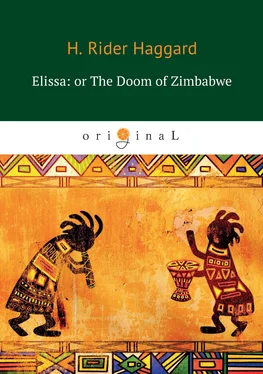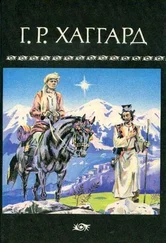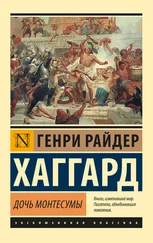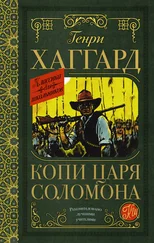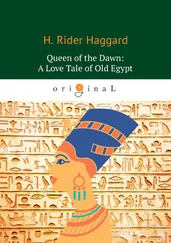H. Rider Haggard
Elissa: or The Doom of Zimbabwe
To the Memory of the Child
Nada Burnham, who «bound all to her» and, while her father cut his way through the hordes of the Ingobo Regiment, perished of the hardships of war at Buluwayo on 19th May, 1896, I dedicate these tales – and more particularly the last, that of a Faith which triumphed over savagery and death.
H. Rider Haggard. Ditchingham.
© T8RUGRAM, 2018
© Original, 2018
Of the three stories that comprise this volume, one, «The Wizard,» a tale of victorious faith, first appeared some years ago as a Christmas Annual. Another, «Elissa,» is an attempt, difficult enough owing to the scantiness of the material left to us by time, to recreate the life of the ancient Phœnician Zimbabwe, whose ruins still stand in Rhodesia, and, with the addition of the necessary love story, to suggest circumstances such as might have brought about or accompanied its fall at the hands of the surrounding savage tribes. The third, «Black Heart and White Heart,» is a story of the courtship, trials and final union of a pair of Zulu lovers in the time of King Cetywayo.
The world is full of ruins, but few of them have an origin so utterly lost in mystery as those of Zimbabwe in South Central Africa. Who built them? What purpose did they serve? These are questions that must have perplexed many generations, and many different races of men.
The researches of Mr. Wilmot prove to us indeed that in the Middle Ages Zimbabwe or Zimboe was the seat of a barbarous empire, whose ruler was named the Emperor of Monomotapa, also that for some years the Jesuits ministered in a Christian church built beneath the shadow of its ancient towers. But of the original purpose of those towers, and of the race that reared them, the inhabitants of mediæval Monomotapa, it is probable, knew less even than we know to-day. The labours and skilled observation of the late Mr. Theodore Bent, whose death is so great a loss to all interested in such matters, have shown almost beyond question that Zimbabwe was once an inland Phœnician city, or at the least a city whose inhabitants were of a race which practised Phœnician customs and worshipped the Phœnician deities. Beyond this all is conjecture. How it happened that a trading town, protected by vast fortifications and adorned with temples dedicated to the worship of the gods of the Sidonians – or rather trading towns, for Zimbabwe is only one of a group of ruins – were built by civilised men in the heart of Africa perhaps we shall never learn with certainty, though the discovery of the burying-places of their inhabitants might throw some light upon the problem.
But if actual proof is lacking, it is scarcely to be doubted – for the numerous old workings in Rhodesia tell their own tale – that it was the presence of payable gold reefs worked by slave labour which tempted the Phœnician merchants and chapmen, contrary to their custom, to travel so far from the sea and establish themselves inland. Perhaps the city Zimboe was the Ophir spoken of in the first Book of Kings. At least, it is almost certain that its principal industries were the smelting and the sale of gold, also it seems probable that expeditions travelling by sea and land would have occupied quite three years of time in reaching it from Jerusalem and returning thither laden with the gold and precious stones, the ivory and the almug trees (1 Kings x.). Journeying in Africa must have been slow in those days; that it was also dangerous is testified by the ruins of the ancient forts built to protect the route between the gold towns and the sea.
However these things may be, there remains ample room for speculation both as to the dim beginnings of the ancient city and its still dimmer end, whereof we can guess only, when it became weakened by luxury and the mixture of races, that hordes of invading savages stamped it out of existence beneath their blood-stained feet, as, in after ages, they stamped out the Empire of Monomotapa. In the following romantic sketch the writer has ventured – no easy task – to suggest incidents such as might have accompanied this first extinction of the Phœnician Zimbabwe. The pursuit indeed is one in which he can only hope to fill the place of a humble pioneer, since it is certain that in times to come the dead fortress-temples of South Africa will occupy the pens of many generations of the writers of romance who, as he hopes, may have more ascertained facts to build upon than are available to-day.
The sun, which shone upon a day that was gathered to the past some three thousand years ago, was setting in full glory over the expanses of south-eastern Africa – the Libya of the ancients. Its last burning rays fell upon a cavalcade of weary men, who, together with long strings of camels, asses and oxen, after much toil had struggled to the crest of a line of stony hills, where they were halted to recover breath. Before them lay a plain, clothed with sere yellow grass – for the season was winter – and bounded by mountains of no great height, upon whose slopes stood the city which they had travelled far to seek. It was the ancient city of Zimboe, whereof the lonely ruins are known to us moderns as Zimbabwe.
At the sight of its flat-roofed houses of sun-dried brick, set upon the side of the opposing hill, and dominated by a huge circular building of dark stone, the caravan raised a great shout of joy. It shouted in several tongues, in the tongues of Phœnicia, of Egypt, of the Hebrews, of Arabia, and of the coasts of Africa, for all these peoples were represented amongst its numbers. Well might the wanderers cry out in their delight, seeing that at length, after eight months of perilous travelling from the coast, they beheld the walls of their city of rest, of the golden Ophir of the Bible. Their company had started from the eastern port, numbering fifteen hundred men, besides women and children, and of those not more than half were left alive. Once a savage tribe had ambushed them, killing many. Once the pestilential fever of the low lands had taken them so that they died of it by scores. Twice also had they suffered heavily through hunger and thirst, to say nothing of their losses by the fangs of lions, crocodiles, and other wild beasts which with the country swarmed. Now their toils were over; and for six months, or perhaps a year, they might rest and trade in the Great City, enjoying its wealth, its flesh-pots, and the unholy orgies which, among people of the Phœnician race, were dignified by the name of the worship of the gods of heaven.
Soon the clamour died away, and although no command was given, the caravan started on at speed. All weariness faded from the faces of the wayworn travellers, even the very camels and asses, shrunk, as most of them were, to mere skeletons, seemed to understand that labour and blows were done with, and forgetting their loads, shambled unurged down the stony path. One man lingered, however. Clearly he was a person of rank, for eight or ten attendants surrounded him.
"Go," said he, "I wish to be alone, and will follow presently." So they bowed to the earth, and went.
The man was young, perhaps six or eight and twenty years of age. His dark skin, burnt almost to blackness by the heat of the sun, together with the fashion of his short, square-cut beard and of his garments, proclaimed him of Jewish or Egyptian blood, while the gold collar about his neck and the gold graven ring upon his hand showed that his rank was high. Indeed this wanderer was none other than the prince Aziel, nick-named the Ever-living, because of a curious mole upon his shoulder bearing a resemblance to the crux ansata , the symbol of life eternal among the Egyptians. By blood he was a grandson of Solomon, the mighty king of Israel, and born of a royal mother, a princess of Egypt.
Читать дальше
